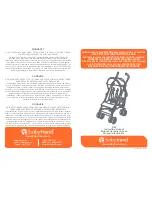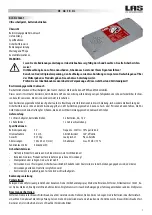
Page 3
VTX series instructions
It is normal practise, on passenger carrying vehicles,
to include some means of disconnecting the battery or
motor in an emergency. This could be a "kill switch",
or perhaps a removable link in the battery wire. This
is to guard against a failure in the controller or
wiring which, although very unlikely, could cause the
motor to run at an uncontrollable top speed. You
must not operate this switch with the motors moving
as (on rare occasions) this could damage the
controller.
Even without such additional safety features, the
VTX range controllers are designed so that failure,
and particularly dangerous failure is very unlikely.
Experience also shows that, in the improbable event
of a power device failing, the device normally acts as
its own fuse, removing drive from the motors.
Furthermore, notwithstanding a very unusual fault,
the motor can be stopped quickly by turning off the
ignition, or turning the speed down to 0. Either action
operates the relays to give full emergency braking.
Most dangerous faults have been due to water
splashes on the board - which is outside of our
control. No manufacturer, however careful, can
always guarantee what will happen in the event of a
failure.
It is important for the last word here be that the
constructor should fit a means of quickly
disconnecting the battery in the event of abnormal
control system operation.
All passenger carrying vehicles should, in any case,
be fitted with a mechanical braking system to
complement regenerative braking.
Reversing
On the VTX controller series, reversing is normally
‘dual ramp’. This means that, when the reversing
switch is operated at speed, the controller slows down
under control of the deceleration ramp, automatically
reverses and accelerates again under control of the
acceleration ramp. If the ramp controls are set for
quick response this process can be quite violent.
Also, reversing is done by monitoring the demand
speed, after the ramp circuit and not by measuring the
motor voltage so that, if the vehicle is reversed when
going down a hill, the motor will still be rotating and
the vehicle will be travelling when reversing occurs.
Reversing can therefore be accomplished on any hill
but it will be more or less violent if the gradient is
steep depending on the setting of the ramp controls.
The user is best advised therefore not to change
direction on steep hills!
Dual Ramp reversing can be deactivated, when the
reversing becomes pre-select. To disengage dual
ramp, alter the header shown in the diagram opposite.
4: Safety
Two models are available, for different current
ratings and with different options.
Each is available as 12v or 24v, but the 24v can be
supplied with resistors in the relays for 36v operation.
VTX-40
40 Amps nominal
55A max typical
VTX-75
75 Amps nominal
110A max typical
The nominal current is available for around 1 minute
(depends on mounting).
For some applications, e.g. double heading loco, two
standard units can be interconnected in tandem (if the
optional expansion connector is fitted).
The voltage is marked on the relays. Make sure these
are correct as 24v relays will not operate from 12v
and 12v relays will soon burn out their coils if used
on 24v.
The 36 version uses the 24v relays but with a resistor
in series with the relay coils and other components
changed as appropriate.
A boxed option is also available.
3: Models


































